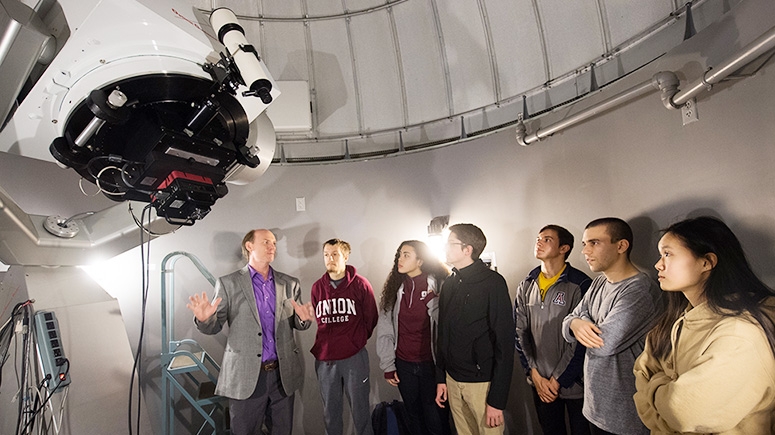Astronomy and Physics
About the Astronomy major
There is no better place to pursue astronomy than Union. Here, your physics and astronomy classes will be small and personal, with labs taught by full-time faculty rather than by graduate students, and instruction that is truly characterized by individual attention. You will also have significant research opportunities and access to advanced equipment usually reserved for graduate students at larger institutions.
Astronomy courses and requirements
-
Courses
- Loading...
-
Major
Loading...
-
Minor
Loading...
-
Interdepartmental major
Loading...
View the planets and gain a galaxy of knowledge by using the Union observatory, which features a 20-inch Ritchey-Chretien telescope.
About the Astrophysics minor
In small classes, you will learn about the wide spectrum of modern physics, with courses in relativity, string theory, black holes, electromagnetism, quantum mechanics and other physical states and relationships that make us see the universe in very different ways.
-
Astrophysics requirements
Loading...
About the Physics major
As a Union College astrophysics minor, you will learn how to apply the principles of physics to astronomical phenomena, leading to an understanding of the structure and history of the universe.
Physics courses and requirements
-
Courses
- Loading...
- Loading...
-
Major
Loading...
-
Minor
Loading...
-
Interdepartmental major
Loading...
After Union
What can a degree in astronomy or physics do for you? Here is what our alumni have been up to:
- Astronomy educator, Astronomical Society of the Pacific
- Creative technologist, Primacy
- Educator, Astronomical Society of the Pacific
- Fulbright researcher, Germany
- Graduate student, University of Wisconsin-Madison
- Creative technologist, Primacy
- Fulbright researcher, Germany
- M.S. candidate in astronomy and astrophysics, University of Amsterdam, The Netherlands
- Ph.D. candidate in astronomy, Yale University
- Applications engineer, EBM–PAPST
- Assistant professor, University of Rochester
- Chamberlain Fellow, Berkeley National Lab
- Data scientist, Kx Systems
- Design assistant, Newgrange Design
- Electrical engineer, Advanced Energy Conversion
- High school physics teacher
- Implementation technology consultant, Paytronix Systems
